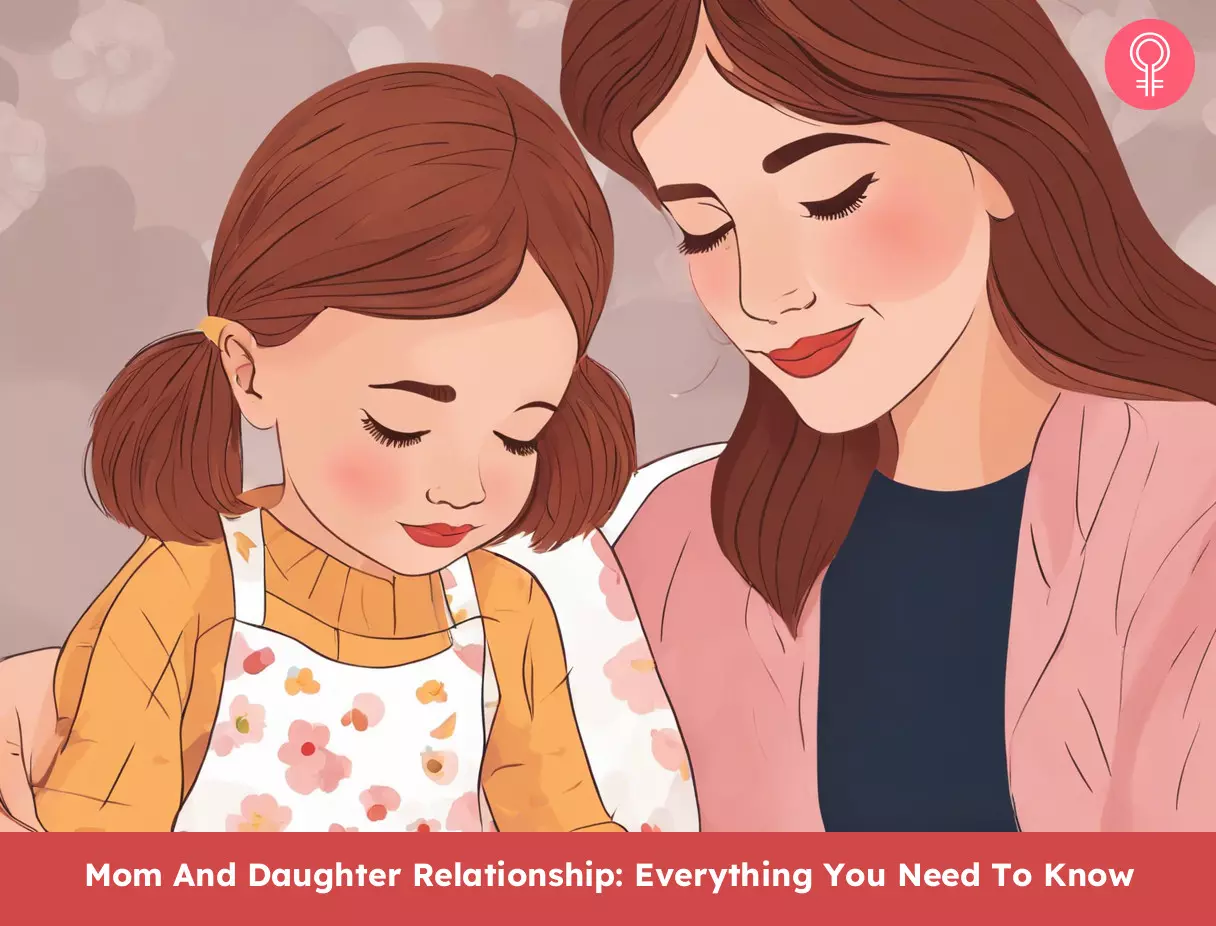Mom And Daughter Relationship: Everything You Need To Know
The ultimate guide to navigating the dynamics of this unique relationship

Image: Shutterstock
A mom and daughter relationship is precious. But, though the bond may appear unbeatable at first, it can eventually deteriorate to the extent where the sight of each other becomes uncomfortable. However, they eventually work out their conflicts and form a caring support network.
Navigating the ever-shifting mother-daughter relationship can be challenging. But, it is not all doom and gloom! Maintaining a healthy relationship is possible, even if you are going through a difficult time. All it requires is some serious reflection and behavior modification. Keep reading this article to learn what you can do to strengthen your bond with your mother or daughter (or both!). Scroll down!
In This Article
Why Do Mother-Daughter Relationships Matter?

The importance of mother-daughter relationships came to light when a study revealed that the relationships between mothers and daughters are the strongest amongst any parent-offspring relationships (1).
In fact, it serves as the cornerstone of the future of any relationship a woman may have with those around her. The mother-daughter relationship holds the internal working model of attachment, which dictates a woman’s connection with others.
This effect also makes sense considering that mothers and daughters may have shared experiences, which scales up to form such a bias and cause mothers to favor their daughters (while fathers favor their sons) (2). Additionally, a mother’s mental health proves to be a vital marker in determining her daughter’s potential mental health conditions (3).
The relationship between mother and daughter is the most valuable connection a woman enjoys in her life. And given the role of maternal figures in translating valuable emotions and life skills like empathy, kindness, and affection, it can be the foundation of how society performs as a whole.
Now let us look at what a healthy mom and daughter relationship looks like.
Key Takeaways
- A mother-daughter relationship is the strongest among other parent-offspring relationships, suggests a study.
- The mother’s mental health has a lot of bearing on their daughter’s condition. So, mothers must pay attention and act responsibly.
- Create an ecosystem of trust, particularly during the tough adolescent phase of the daughter, to make the relationship stay honest throughout.
Traits Of A Healthy Mother-Daughter Relationship

- They acknowledge each other as individuals and spend adequate time – neither too much nor too little. The mother-daughter duo recognizes and respects boundaries. They make reasonable commitments to each other and come through on them.
- They accept each other the way they are rather than forcing them to conform to a particular set of ideals.
- They can disagree without being disrespectful.
- Most of their conversations are open and honest, without guilt-tripping the other into doing or saying something they would not engage in on their own volition.
- Both contribute equally to the relationship, and none of the parties bear the upper hand.
- Mothers should allow their daughters to experience (and overcome) failures, while daughters should encourage mothers to widen their horizons and push their mental barriers.
In contrast to what we have seen in the previous section, here are the signs of a toxic mom and daughter relationship.
Signs Of Dysfunctional Mother-Daughter Relationships

- You are quick to pass judgment or be judged, and most of the criticism is harsh and counter-productive. Being dismissive of each other’s actions or emotions.
- There is no proper bonding; instead, the relationship is extremely taxing on one’s emotions, time, and attention.
- Off-hand, distasteful, or unwarranted jokes about hurtful things.
- If your relationship constantly involves drama, it is far from healthy.
- A toxic mother-daughter relationship makes you the source of happiness, which can come at the cost of your mental health.
- You feel helpless when it comes to setting boundaries or standing up for yourself.
Marcie Boyer, an existential life coach and blogger, shared that she had an unnatural relationship with her mother, where her mother was overly protective of her. She explains that this happened because her mother was forced to abort her, and she somehow survived it. She states in her blog post, “Throughout childhood, my mother would spend hours listening to me breathe while I slept to make sure that I was still alive. Growing up, she obsessively worried for my safety (i).”
- You find yourself constantly bickering with each other instead of having healthy communication.
- Involve problematic parenting behaviors, such as gaslighting, manipulation, guilt-tripping, and minimizing.
 Quick Tip
Quick TipThese are some signs of dysfunctional mother-and-daughter relationships. Now let us see what happens to a mother-daughter relationship when a daughter hurts her mother.
When A Daughter Hurts Her Mother
A mom and daughter relationship is often deep and intricate, making any hurtful experience especially painful. When a daughter hurts her mother, their relationship is shattered, and intense emotional suffering results. It can be a complex and emotionally challenging situation for both of them. Setting boundaries is thus essential during this period. Both individuals should openly share their feelings and needs, understand each other, and have empathy in this scenario, which can aid in managing emotional challenges and restoring trust. The aim should be to seek resolution through open dialogue, mutual respect, and understanding. Sometimes, identifying underlying issues, such as differing perspectives, unmet expectations, and miscommunication, helps heal wounds. Also, forgiveness and a dedication to a more solid, long-lasting relationship are necessary for rebuilding trust.
Relationships between mothers and daughters can be broadly classified into the following categories.
Types Of Mother-Daughter Relationships
1. The BFF Duo

Becoming good friends with your mother or daughter has more perks than earning a friend for life. Such a relationship rests on the pillars of trust, love, and mutual respect, where mothers and daughters freely express themselves and share emotional experiences. It instills the confidence that your mother or daughter will always be there for you for support, advice, or to lend an ear.
Consider the trust that is built when you and your mother start sharing daily updates about your lives. From funny moments to personal struggles, this open communication strengthens your bond. It creates a safe space where you can confide in each other without fear of judgment. Whether you need advice or just want to vent, you know you always have a trusted friend to turn to.
2. The Detached Strangers
Here, the mother and daughter hardly know anything about each other’s lives because they choose not to get involved or do not care enough despite being family. Either way, disengagement makes the relationship strained and can lead to poor mental health.
For example, say you and your mother live in the same house but rarely have meaningful conversations. You pass each other in the hallway, exchanging only basic pleasantries, never discussing your thoughts or feelings. Over time, the emotional distance grows, making it harder to connect when support is truly needed.
3. The Enmeshed
While detached mother-daughter relationships sever the cord, enmeshed relationships compact them into one. It is one of the most toxic forms of relationships as it sets unrealistic expectations that result in devaluation.
The mother fails to respect boundaries and tries to seek validation through her daughter. On the other hand, the daughter feels pressured into living up to her mother’s expectations regardless of her desires.
Therefore, both of them lose their identity and individuality, leading to a relationship breakdown. This attachment style is common in abusive mother-daughter relationships where one is narcissistic, and the other is co-dependent.
For example, say you and your mother do everything together. While it seems like closeness, slowly, you start feeling trapped, unable to express your own desires without guilt. Meanwhile, your mother depends on you for emotional reassurance, making it difficult for either of you to establish independence. Over time, resentment builds, causing tension rather than true connection.
4. The Control Freak
It may be hard to differentiate between enmeshed and controlling mother-daughter relationships. However, both are not the same. While a mother may push her daughter to perform better, a controlling one will shrink her passions or desires. Some may even try to pass off this behavior under the guise of being protective. It restricts the child, limits their potential, and takes away their independence.
For example, say you have a passion for art, but your mother insists you pursue a career she believes is more stable. Whenever you bring up your dreams, she dismisses them, saying she knows what’s best for you. Though she claims to protect your future, her control leaves you feeling unheard and powerless, making it difficult to build confidence in your own choices.
5. The Discard-Dismisser
We find one-sided rejection in this kind of difficult mother-daughter relationship. The dismissive action can be due to apathy or because the mother or daughter is impossibly hard to please. It leaves them longing for recognition and appreciation for the efforts they put into the relationship.
For example, say you always try to share your achievements with your mother, hoping for a word of encouragement, but she barely acknowledges them. When you express your feelings, she brushes them off, making you feel like your efforts never matter. Over time, you stop trying to connect, realizing that no matter what you do, it’s never enough.
6. The Helicopter Tyrant
“Why? Because I said so”. If these words sound far too familiar, you have a mother who conceives herself as the ultimate authority. While they may have the best intentions at heart, the constant micromanaging, criticism, and interference make the mother and the daughter feel that any deviation from this pattern will result in failure. As a result, the mother-daughter relationship turns parasitic.
For example, say you want to make a simple decision, like picking an outfit for an event, but your mother insists on choosing one for you. If you disagree, she criticizes your choice and warns you that you will regret not listening to her. Over time, you second-guess yourself on even the smallest decisions, fearing that going against her will lead to failure or disappointment.
7. The Roles Reverse

Children have to parent their kids with time. If the daughter acts like a responsible adult from an early age, while the mother behaves like a sibling or liability more than a parent, the mother-daughter relationship is dysfunctional. Such a relationship is common in daughters of mothers who are young, immigrant, alcoholic, or depressive.
For example, say your mother frequently turns to you for emotional support, venting about her problems while expecting you to comfort her. Instead of guiding you through life, she relies on you to make decisions and take responsibility for household matters. Over time, you feel the weight of being the caretaker, forced to grow up too fast while longing for the parental support you never received.
Healthy mother-daughter relationships will give rise to confident, compassionate, caring, and empowered women. On the flipside, troubled relationships can set the stage for a range of emotional and mental issues.
Effects Of A Toxic Mother-Daughter Relationship
- Poor Self-Esteem: An abusive mother-daughter relationship can normalize bad behavior and set the bar too low for interpersonal relationships. Being treated unfairly will have both parties doubt themselves and negatively affect their self-esteem.
- Depression: Emotional distance or detachment may lead to mental health issues like depression.
- Commitment Issues: The mother-daughter relationship breakdown can make them wary of those around them. This dysfunctional bond leaves behind deep-rooted insecurities that may reflect into other relationships.
- Poor Conduct: Emotionally abusive relationships between mothers and daughters can breed unresolved resentment, jealousy, and hostility, leading to unreasonable and unpardonable actions.
Whether the conflict arises due to a toxic mother or a daughter, it is imperative to work on repairing the relationship while reflecting on oneself. Here are some actionable tips on how to foster a healthy mother-daughter relationship.
How To Improve Mother-Daughter Relationships
- Be the first to extend the white flag rather than waiting for the other to make the first move. If your attempts are met with silence, learn to give up and sever the cords when necessary.
Since you cannot control how the other person reacts or behaves, healing must start with the self. So work on yourself first. - Encourage the willingness to change and create an environment where you contribute to each other’s personal growth.
- Set realistic expectations on the kind of relationship you wish to have. Role modeling can help set examples. Be pragmatic about the same as behavioral changes may take a while to show effect.
- Learn each other’s love language and find ways to express care in a manner that influences the other.
- Try to incorporate transparent and open-ended conversations to put across your point without triggering defensiveness.
- If you find the situation escalating, declare that you wish to discuss this issue later. This will help you manage your emotions effectively.
- Foster an ecosystem of trust, especially during the tough adolescent phase, so that the relationships between mother and daughter stay honest throughout.
- Learn the art of active listening by echoing the other person’s concerns. Let them know that you are comprehending their intent and emotions.
- Gain an outsider’s perspective or put yourself in the other’s shoes to empathize with their condition and respect their feelings.
- If you cannot reconcile your differences, try to forgive the other person without condoning, minimizing, or pardoning the core issue.
- Maintain the subtle balance of staying close and connected without compromising on your individuality and beliefs.
- Establish healthy boundaries so that you can assert separateness in case of toxic mother-daughter relationships.
- Become comfortable with the idea that some issues may not resolve, and you may end up in a deadlock where you agree to disagree with each other.
- Rather than dredging up things from the past, prevent any further relationship breakdown by focusing on the present.
- Follow the 20-second rule. Put forward your perspective in 20 seconds or less during a conflict. Then, allow the other party to speak about their experience in the next 20 seconds. This technique enables you to stay on track of the current conflict than digressing.
- Stay respectful towards each other even during a conflict or disagreement. Aim for quick conflict resolution and avoid involving third parties for resolution or badmouthing the other.
- Set aside a fixed date, time, and schedule for routine mother-daughter hangout sessions.
Now that you know how to improve a mother-daughter relationship, here are some activities you can engage in as a mother-daughter team to strengthen your relationship.
Activities To Strengthen Mother-Daughter Relationships
Mothers and daughters can strengthen their relationship through activities and communication strategies. Here are some specific ways to build a deeper bond.
1. Schedule Regular One-On-One Time
Set aside dedicated time for just the two of you, whether it’s a weekly coffee date, a walk in the park, or a cozy movie night at home. Prioritizing quality time helps maintain a strong connection.
2. Start A Shared Hobby
Engage in an activity that you both enjoy, such as baking, gardening, yoga, or painting. The joy of learning or creating something together strengthens your bond through shared experiences, making you feel more connected and happy.
3. Create A Gratitude Journal Together
Start a mother-daughter journal in which you both write things you appreciate about each other or share positive experiences. This will help reinforce appreciation and mutual respect.
4. Have Open And Honest Conversations
Encourage open communication by actively listening without judgment. Set aside time to talk about life and personal dreams to build emotional intimacy.
5. Take A Trip Together
Whether it’s a weekend getaway or a day trip, traveling together provides opportunities for new experiences and deep conversations that strengthen your relationship.
6. Cook Or Try New Recipes Together
Cooking as a team builds collaboration and fun. Take turns picking recipes, or try making a traditional family dish while reminiscing about special memories.
7. Read The Same Book And Discuss It
Choose a book to read together and discuss it. It can be fiction, self-improvement, or anything that sparks interesting conversations.
8. Write Letters To Each Other
Occasionally, writing heartfelt letters expressing gratitude or memories can be a meaningful way to deepen your connection.
9. Volunteer for A Cause Together
Giving back as a team, whether at a local shelter or community event, can create a shared sense of purpose and strengthen your relationship through teamwork.
10. Practice Self-Care Together
Have a self-care day with spa treatments, face masks, or meditation. Prioritizing wellness together promotes bonding and makes you feel relaxed and rejuvenated.
11. Establish Special Traditions
Create personal traditions, like an annual mother-daughter day, holiday rituals, or celebrating milestones with a special activity unique to your relationship.
12. Give Each Other “Surprise Appreciation” Notes
Leave little notes in each other’s bags, cars, or around the house with positive affirmations or words of encouragement to show love and appreciation.
13. Take A Class Or Workshop Together
Sign up for a fun class, such as dancing, pottery, photography, or a DIY craft workshop. Learning something new together builds teamwork.
14. Share Music Or Movie Playlists
Create a shared playlist with favorite songs from different eras, or have a movie night with each other’s favorite films to spark conversations about memories and tastes.
15. Encourage Each Other’s Personal Growth
Support each other’s personal goals and dreams by offering encouragement and celebrating achievements together.
Strengthening a mother-daughter relationship requires effort and understanding, but these activities can help create a lasting bond.
 Trivia
TriviaInfographic: How To Raise Strong Daughters
While it is important to build a good bond with daughters, it is also necessary to help them build strong character and personalities. The world out there is harsh and full of challenges. Check out the infographic below to learn how to raise strong daughters who can stand their ground and face all challenges head-on. Illustration: StyleCraze Design Team
A mom and daughter relationship is placed on such a high pedestal that we often forget how every relationship is different. Studies have shown that relationships between mothers and their daughters can be the strongest among other parent-offspring relationships. However, it is okay if the relationship doesn’t live up to ridiculously high standards. Let the innate scope for emotional connection bloom. Create a healthy environment for emotional expression and understanding. If you sense that the discord is severe, seek the help of therapists and counselors. A little bit of effort in the relationship will go a long way!
Frequently Asked Questions
What steps can I take to restore trust after a conflict with my mother/daughter?
To rebuild trust after a conflict with your mother or daughter, prioritize open communication, actively listen to each other’s feelings, apologize sincerely, and consistently demonstrate reliability.
How do you deal with a hurtful daughter?
There is a common phase in teenage life where children just do not get along with their parents and often say or do things that parents find hard to deal with. It could be helpful to go back to your teenage years and realize that all children want is to fit in, be heard, feel valued, and be appreciated. If your daughter is acting out, it might be because she wants someone to listen. So reach out and try to be there for her in whatever ways she needs you.
Why are mother-daughter relationships so hard?
Mother-daughter relationships can be hard sometimes because of the differences in perspective and ideologies. Growing up, most daughters are the spitting image of their mothers – not just in appearance but also in how they carry themselves. However, as daughters grow older, they may become more independent and view the world differently, which could stir some tension in the mother-daughter dynamics.
What can daughters do if they feel their mother is too controlling or critical?
Daughters can first try to understand where it comes from. Mothers might behave in a controlling manner if they have poor self-esteem, insecurities, or traumatic experiences from the past which might be leading them to be overbearing and critical of their children. The best way to address the situation is to ‘talk it out’, make her sit down, and have a chat with her. Try assuring her that you love her and want to have a life of your own.
What can mothers do if they feel their daughter is distant or unresponsive?
The first and foremost thing a mother should do is communicate it to her daughter and try to understand where it comes from. Whether it is because your daughter feels you are restricting her freedom, not tending to her emotional needs, or being verbally abusive. By understanding the issues and reflecting on them, you can build a healthy relationship.
Illustration: Mom And Daughter Relationship: Everything You Need To Know

Image: Stable Diffusion/StyleCraze Design Team
This heartwarming video beautifully captures the bond between a mother and daughter, reminding us all of the unconditional love, as well as shared laughter and tears that truly define family. Check it out!
Personal Experience: Source
StyleCraze's articles are interwoven with authentic personal narratives that provide depth and resonance to our content. Below are the sources of the personal accounts referenced in this article.
i. My therapist told me I had an “unnatural relationship” with my mother. Today, I’m okay with that.https://medium.com/@marcielboyer/a-therapist-once-told-me-i-had-an-unnatural-relationship-with-my-mother-today-i-m-okay-with-that-6254a2b4c7b0
References
Articles on StyleCraze are backed by verified information from peer-reviewed and academic research papers, reputed organizations, research institutions, and medical associations to ensure accuracy and relevance. Read our editorial policy to learn more.
- Mothers’ and Their Adult Daughters’ Perceptions of Their Relationship
https://journals.sagepub.com/doi/abs/10.1177/0192513×10384073 - Do Mothers Spend More on Daughters While Fathers Spend More on Sons?
https://myscp.onlinelibrary.wiley.com/doi/10.1002/jcpy.1004 - Female-Specific Intergenerational Transmission Patterns of the Human Corticolimbic Circuitry
https://www.jneurosci.org/content/36/4/1254 - Mother-daughter Relationship And Daughter’s Self Esteem
https://www.sciencedirect.com/science/article/pii/S1877042813016273
Read full bio of Dr. Chloe Carmichael
Read full bio of Sneha Tete
Read full bio of Asmita De
Read full bio of Gracia Odile




























Community Experiences
Join the conversation and become a part of our empowering community! Share your stories, experiences, and insights to connect with other beauty, lifestyle, and health enthusiasts.